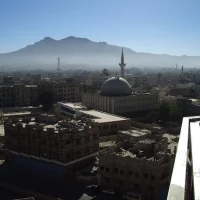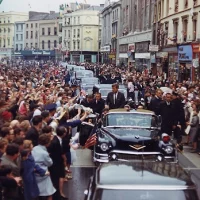Guns, cocaine, and kidnappings—this was the state of much of Colombia in the early 1980s. Medellín in particular, home to the rising Cartel de Medellín and leftist guerrilla insurgents, was the bedrock of anti-Americanism in the country during these years. Strikingly, Medellín was also home to a U.S. consulate at the time, hosting a total… Read More "The Last American Diplomat in Medellín—Countering Anti-Americanism in Cartel-Era Colombia"
CNN, Tanks, and Glass Walls: The August 1991 Coup
In August of 1991, hard-liners opposed to Soviet President Mikhail Gorbachev initiated a coup attempt to overthrow him. The rebellion occurred in part because of financial strife as the Soviet Union transformed quickly from a statist to a market-based economy. Long lines formed for essential goods including medicine and fuel, and grocery shelves were empty.… Read More "CNN, Tanks, and Glass Walls: The August 1991 Coup"
Yemen has experienced violence and poverty in recent decades, but for centuries was a pivotal crossroads for trade and travel. Once the center of civilization, commerce and wealth on the Arabian Peninsula, Yemen prospered through agriculture and the cultivation and marketing of spices and aromatics. In the twentieth century, Yemen was cleaved in two separate nations… Read More "North Yemen: Ambassador to a Divided Land"
Relations between the U.S. and Ireland have traditionally been strong, thanks to common ancestral ties, history and shared values. Irish citizens immigrated to the thirteen Colonies, fought in the War of Independence and were among the first to drive cattle westward. Prompted largely by the Great Irish Famine, from 1820 to 1860 two million Irish… Read More "Ireland and the U.S.: The Best of Friends, Except When They Weren’t"
Mission Unspeakable: When North Koreans Tried to Kill the President of South Korea
On October 9, 1983, while South Korean President Chun Doo-Hwan was on a visit to Rangoon, Burma to lay a wreath at the Martyr’s Mausoleum of Swedagon Pagoda, a bomb concealed in the roof exploded, killing 21 people including four senior South Korean officials. President Chun was spared because his car had been delayed in… Read More "Mission Unspeakable: When North Koreans Tried to Kill the President of South Korea"
The Technology of Terror – South America in the 70s and 80s
Terrorism the world over poses a threat to the lives of Foreign Service Officers. Throughout the 1970s and 1980s terrorist groups threatened the safety of FSOs serving in South America. In Argentina, two such groups, the People’s Revolutionary Army (ERP) and Montoneros, resorted to armed resistance 1969-1970 in response to the regime of Juan Carlos… Read More "The Technology of Terror – South America in the 70s and 80s"
Crisis Management: Occupation of USIS in South Korea, 1985
On May 25, 1985, seventy-three South Korean students barged into the United States Information Services (USIS) library in Seoul and began a three-day occupation. The students’ primary demand was an apology from the U.S. Ambassador, Richard L. “Dixie” Walker, as the representative of the American government, for the United States’ alleged role and complicity in… Read More "Crisis Management: Occupation of USIS in South Korea, 1985"
The 1991 Coup Against Mikhail Gorbachev
In August 1991, hard-line members of the Communist Party of the Soviet Union (CPSU) who opposed President Mikhail Gorbachev’s reforms and decentralization of government powers tried to overthrow him. The short-lived coup attempt is considered pivotal in the rise of Boris Yeltsin and the eventual breakup of the USSR. The attempt took place at a… Read More "The 1991 Coup Against Mikhail Gorbachev"
Kimberley Process: Commercial Diplomacy to Stem the Flow of Blood Diamonds
During the 1990s, several African countries, namely Angola, Cote d’Ivoire, the Democratic Republic of the Congo, Sierra Leone, and Liberia were plunged into chaos and embroiled in devastating civil wars. Thanks to economic and political insecurity and contentious inter-ethnic relations, rebel groups such as the Patriotic National Front of Liberia under the leadership of Guy… Read More "Kimberley Process: Commercial Diplomacy to Stem the Flow of Blood Diamonds"
An Embassy in Flames: Islamabad, 1979
The November 21, 1979 attack on the American Embassy in Islamabad started as a small group demonstration in front of the embassy, where protesters shouted anti-American slogans and demanded entry into the campus. Police officers were able to stop the protesters and have them leave the area. However, about fifteen minutes later, some six busloads of Pakistani… Read More "An Embassy in Flames: Islamabad, 1979"


